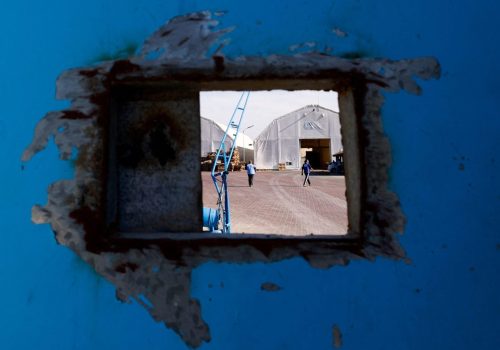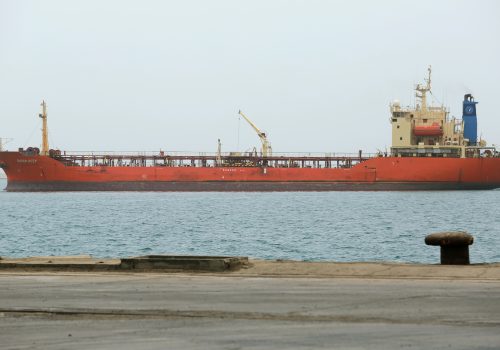Will US-UK strikes against the Houthis halt their Red Sea aggression?
JUST IN
They’re seeing red. On Thursday, the United States and the United Kingdom carried out air and missile strikes in Yemen after weeks of attacks by the Houthis on shipping vessels in the Red Sea that had disrupted global commerce. Will these strikes deter the Iranian proxy group from further attacks? Will they embroil the United States in a wider Middle East conflict amid Israel’s campaign against Hamas in Gaza? Our regional security experts are reporting for duty.
TODAY’S EXPERT REACTION COURTESY OF
- Jonathan Panikoff (@jpanikoff): Director of the Scowcroft Middle East Security Initiative and former deputy US national intelligence officer for the Near East
- Kirsten Fontenrose: Nonresident senior fellow in the Scowcroft Middle East Security Initiative and former US National Security Council senior director for the Gulf
- Daniel E. Mouton: Nonresident senior fellow in the Scowcroft Middle East Security Initiative and former US National Security Council director for defense and political-military policy for the Middle East and North Africa
What did the strikes do?
- The strikes in Yemen are “unlikely to immediately halt Houthi aggression in the Red Sea,” warns Jonathan. But the goal is, instead, to restore deterrence as soon as possible. “That will almost certainly mean having to continue to respond to Houthi strikes, and potentially with increasing aggression,” he adds.
- Kirsten notes that inaction would only “encourage further attacks on global shipping.” She adds that Houthi attacks will continue but these strikes “could deplete Houthi capabilities to extend or intensify their military actions.”
- Dan explains that the strikes were defensive in nature and appear to be limited to command-and-control, maritime-domain awareness, and attack capabilities. “This focused response against the Houthis makes escalation less likely as the targets can be considered legitimate military targets,” he says.
Subscribe to Fast Thinking email alerts
Sign up to receive rapid insight in your inbox from Atlantic Council experts on global events as they unfold.

How will the Houthis respond?
- “The Houthis view themselves as having little to lose, emboldened militarily by Iranian provisions of support and confident the United States will not entertain a ground war,” explains Jonathan.
- Dan points out that the Houthis did not change course after US strikes in 2016, or the Saudi bombardment since then. “Far from being deterred, the Houthis instead invested their resources, and those provided by Iran, into increasingly capable weapons systems.”
- The Houthis made a “grave miscalculation” that the United States would not respond with force, Kirsten tells us, thinking that the “redline” would be the killing of an American and that US President Joe Biden would be reluctant to use force in an election year. “Both were a misread in the current context.”
Will Iran respond?
- The strikes in Yemen are unlikely to provoke a direct escalation with Iran, says Kirsten. “There is no motive for Iran to underscore its ties to the conflict or the Houthis at this juncture,” she explains, since Tehran is already achieving its strategic goals with declining US popularity around the world and faltering Israeli efforts to improve its diplomatic ties in the Arab world.
- Iran will continue to supply the Houthis, Dan notes, meaning the coalition’s “ability to interdict Iranian resupply” may determine “the success of additional rounds of strikes.”
- The strikes were nonetheless necessary to send a message to Iran, says Jonathan. “If Iran and its proxies view themselves as free to exert terrorist and malign influence throughout the region without fear of retribution, the risk of regional conflict—and a longer and deadlier one—would be even more likely in the coming months and years.”
The view from Riyadh
- Amid negotiations to end its conflict with the Houthis, Saudi Arabia “is likely to have mixed views of the strike,” Jonathan tells us.
- “Riyadh is certain to be concerned that the Houthis will end negotiations and retaliate directly by attacking Saudi soil,” Jonathan adds. But at the same time, the Saudis likely recognize that “negotiations with the Houthis will be more challenging the greater the leverage the Houthis gain—and the ability of the group to operate in the region with impunity certainly increases its leverage.”
- Kirsten points out that the United States has chastised Saudi Arabia and blocked arms sales over the war in Yemen. Now Riyadh will “smirk watching the US acknowledge that the Houthi threat merits military action,” leaving the kingdom “quietly ecstatic” about the strikes. As for peace talks, she adds, “strikes will not jeopardize political talks any more than ongoing Houthi intransigence routinely does.”
Further reading
Tue, Oct 24, 2023
The global consequences of the Israel-Hamas war are just beginning. Here’s what to watch.
The Big Story By Kirsten Fontenrose
It's hard to predict what decisions the players will make tomorrow, but here are the early warning signs that could indicate what will come next in the Middle East and beyond.
Wed, Dec 20, 2023
What’s behind the attacks on ships in the Red Sea
New Atlanticist By Ellen Wald
Houthis have increased drone and missile attacks against commercial ships in the area, and companies are suspending routes through the Suez Canal.
Mon, Dec 11, 2023
Threats from Yemen are increasing. It’s time to redesignate the Houthis.
MENASource By R. Clarke Cooper
Ever since the 2021 lifting of FTO status, the world has witnessed the increased threats emanating from Yemen, which include recent repeated attacks on commercial ships with drones and missiles
Image: FILE PHOTO: Houthi military helicopter flies over the Galaxy Leader cargo ship in the Red Sea in this photo released November 20, 2023. Houthi Military Media/Handout via REUTERS/File Photo


